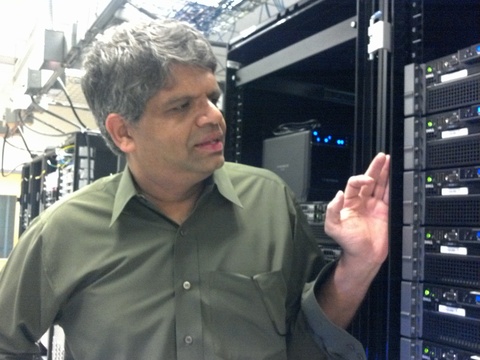Faculty Spotlight: Ramesh Sitaraman

CICS Professor Ramesh Sitaraman looks back over a career in research and industry and finds that risk-taking, the sorrow of September 11th, and a little bit of luck, helped him find his way.
----------
The only thing constant in my 20+ years of computing research has been change. I started my research career in Princeton as a student wanting to do purely theoretical research. Though in the back of my mind, I had a vague belief that all good theory should somehow also be practical and improve people's lives. My Phd thesis developed a theoretical approach to make large unreliable networks function as if they were fully reliable, albeit with a small loss in performance. The approach was to emulate a reliable "guest" network over an unreliable "host" network - we call these "overlay" and "underlay" respectively in today's parlance.
When I arrived at UMass in the 1990's, I tried hard to see if my theoretical research could be practical. But, disappointingly, there were few takers, since there weren't many large, unreliable networks that people really cared about.
That is, until the Internet serendipitously came of age in the late 1990's. All of a sudden, making the Internet reliable was the talk of the town and enterprises were starting to use it in important ways. And, it seemed to me that the theoretical framework of making networks reliable by using an overlay could work, at least as a general concept.
One of my mentors from my grad school years (Tom Leighton) decided to start a company called Akamai with one his students (Danny Lewin) to explore the possibility of making the Internet reliable by building an overlay on top of it. We now call such an overlay a content delivery network (CDN, for short). The opportunity seemed too challenging to miss. So, I left my comfort zone in academia for a few years to join my colleagues to help build Akamai.
In those days, the Internet bubble was raging. But, when the bubble burst, we were plunged into an abyss. And, worst of all, September 11th happened. Danny on flight AA11 on his way to a business meeting on the west coast was the first person killed that day. The loss of a brave and brilliant colleague and friend was too much for me to bear. And, the future of Akamai seemed to hang on a thread.
But, just when it was darkest, there was also a sliver of light. On Sept 11th, the only way people could get the news rapidly was from the Internet! For the first time, the Internet was seen as truly mission-critical to society. And, the Internet reliably scaled to provide news and videos to millions of people around the world only because of CDNs, validating our work in an ironic turning point for Akamai and the use of CDNs on the Internet. Today, Akamai is a successful company delivering a significant portion of Internet. And, CDNs deliver most of the online web, videos, and applications that you access today.
Leaving industry was an even harder decision, especially as Akamai was beginning to be successful. But, I missed "blue skies" research and thinking about what I wanted, without the constraints of business. And, most of all, I missed teaching and being around the many super-bright students at UMass. After my return, I have continued to work on Internet-scale distributed systems, looking a decade or two into the future. Making the Internet more reliable, higher performing, more secure, and more energy efficient is my main focus.
Looking back on the years, perhaps the best advice I can give to young people is to never label themselves as a particular type of scientist who does a particular type of work. Be curious about anything and everything. And, don't hesitate to get out of your comfort zone to cross the boundaries of theory versus practice, or academia versus industry. Most important scientific advances come at the boundaries between disciplines. Finally, always follow your heart and do what you like, and don't be disheartened if it isn't leading anywhere since you never know when serendipity may smile on your work.